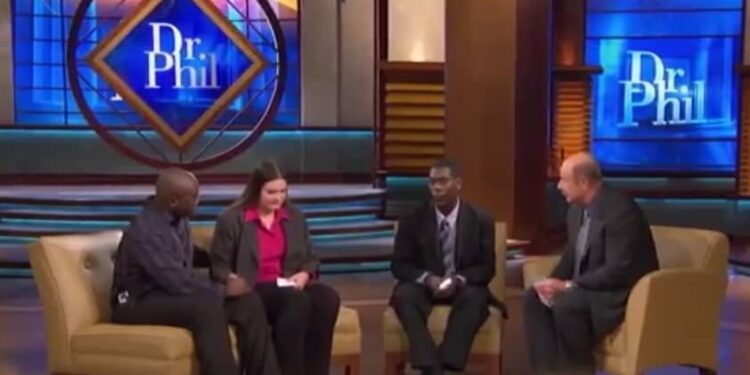In an emotionally charged episode of the Dr. Phil show, a heart-wrenching story of mistaken identity, pain, and redemption unfolded, captivating viewers around the world.
The episode featured a woman named Loretta, who at the age of 15 was brutally vi0lated, and the man she mistakenly identified as her att@cker.
This man, Dean, had spent 14 years in prison for a crime he did not commit, only to be exonerated by DNA evidence years later.
The tragic story began when Loretta, a teenager, endured a horrific assault that left her physically and emotionally scarred. In the aftermath of the trauma, she bravely identified her attacker, believing with all her heart that she had pointed out the right man. Her testimony played a crucial role in the police investigation, leading to Dean’s conviction and subsequent imprisonment.
For 14 long years, Dean’s life was turned upside down. Separated from his fiancée and children, he missed out on precious moments and endured the harsh realities of prison life. Throughout his incarceration, Dean maintained his innocence, clinging to the hope that one day the truth would set him free.
That day came when the Innocence Project, a nonprofit organisation dedicated to exonerating wrongfully convicted individuals, took up Dean’s case. Advances in forensic science allowed for DNA evidence from the crime scene to be re-examined. The results unequivocally proved Dean’s innocence, leading to his release and exoneration.
The revelation of Dean’s innocence sent shockwaves through Loretta’s world. She was devastated to learn that the man she had identified was not her attacker. The realisation that an innocent man had lost 14 years of his life because of her mistake was overwhelming. Seeking to understand how this had happened, Loretta reached out to Dr. Phil for help.
In the trending video, Dr. Phil sits down with Loretta, who is visibly struggling with the weight of her actions. He explains the psychological and emotional factors that can influence memory, especially in the aftermath of a traumatic event. Loretta’s identification, made under immense stress and pressure, was a tragic error—not an uncommon occurrence in the criminal justice system.
As Loretta grapples with the truth, Dr. Phil offers her an opportunity to meet Dean face-to-face. Dean, despite the years lost and the pain endured, graciously agrees to the meeting, hoping it will bring some closure and understanding for both of them.
The meeting is filled with raw emotion and palpable tension. Loretta, tears streaming down her face, expresses her deepest remorse. “I am so sorry,” she says, her voice breaking. “I truly believed you were the one. I can’t imagine the pain and suffering you went through because of my mistake.”
Dean, though visibly affected, responds with remarkable grace and composure. “I understand,” he says softly. “You were a v!ctim too, and you did what you thought was right. It’s a difficult situation for both of us. I’m not here to hold grudges but to find some peace and move forward.”
Their conversation, mediated by Dr. Phil, delves into the complexities of memory, the imperfections of the justice system, and the profound impact of wrongful convictions. Dean shares his experiences from prison, the isolation, and the longing for his family, while Loretta speaks of her ongoing struggle with the trauma and guilt.
This poignant encounter serves as a powerful reminder of the fallibility of human memory and the importance of reliable evidence in the pursuit of justice. It highlights the need for reforms in the criminal justice system to prevent such tragic errors from occurring in the future.
The episode has resonated deeply with viewers, sparking widespread discussions about justice, forgiveness, and the enduring human capacity for empathy and understanding. Many have expressed their admiration for both Loretta and Dean, praising their courage and willingness to face such a painful truth.
In the aftermath of their meeting, Loretta and Dean each embark on their own paths toward healing.
Watch video below









